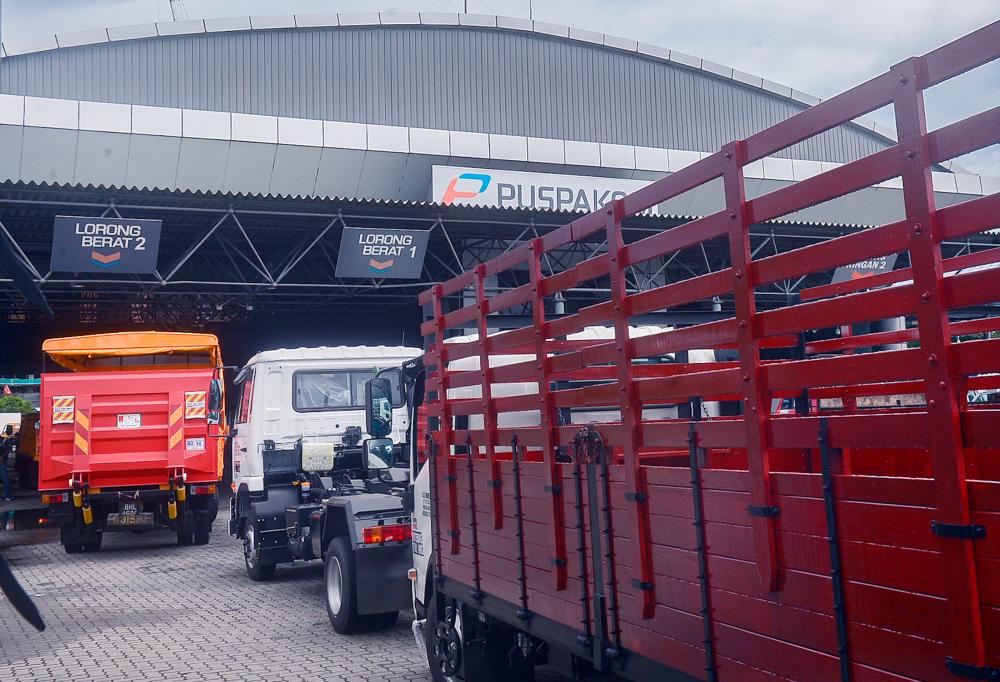PETALING JAYA: The Malaysian Institute of Road Safety Research (Miros) is calling for more regular and rigorous inspections of heavy commercial vehicles to enhance road safety and ensure compliance with safety standards.
This follows the Computerised Vehicle Inspection Centre (Puspakom) revealing on Jan 1 that over 220,000 commercial vehicles failed their annual inspections.
The braking system, side slip and tyres were identified as the top three issues affecting commercial vehicles such as lorries and buses during its inspections.
Miros director-general Assoc Prof Dr Siti Zaharah Ishak said consistent inspections encourage drivers and companies to prioritise safety over negligence, making them more accountable.
“More importantly, it sends a signal to everyone that authorities are consistently monitoring the operation of commercial vehicles and increases public confidence,” she said.
Siti Zaharah noted that existing laws already establish minimum requirements for safety and roadworthiness. However, she added that further improvements could be achieved by benchmarking against practices in advanced countries.
“The Transport Ministry recently formulated several initiatives, including a special task force involving various stakeholders, which will develop strategies to enhance safety while enforcement will be strengthened through collaboration with agencies such as the Road Transport Department (RTD) and police.
“The ‘High Speed – Weigh in Motion’ system will be expanded for load monitoring, and automated awareness safety system cameras will be upgraded to track vehicle speeds more effectively,” she said.
Siti Zaharah also noted that Puspakom inspections will now include critical safety checks such as tyres and brakes to ensure compliance with safety standards.
On Dec 29, 2024, seven people were reported dead and 33 others were injured in an incident involving a bus, two lorries and two cars on the North-South Expressway between Ayer Keroh and Simpang Ampat, Malacca.
An investigation revealed that the front right tyre of a trailer lorry detached and landed in the middle lane, causing the bus to lose control and veer into the opposite lane.
The bus then collided with three other vehicles, including a car, a lorry driven by a man with an attendant and an MPV carrying eight people travelling in the opposite direction.
Siti Zaharah said tyre neglect is a major factor in road accidents involving commercial vehicles as tyres support the vehicle’s weight and endure constant motion.
She explained that heavy goods vehicles such as buses cover significant distances daily and factors such as high mileage and overloading further strain the tyres.
Recently, RTD acknowledged the existence of “cosmetic agents” who provide services such as tyre rentals to help heavy vehicles pass Puspakom inspections.
“The issue largely stems from a mindset problem among our citizens, whether they truly understand the consequences of their actions.
“Tackling this is challenging because we cannot simply interrogate and accuse someone while they’re making so-called ‘cosmetic changes,’” she said.
Meanwhile, Malaysia Tipper Lorry Operators Association secretary Tan Boon Hing urged enforcement agencies to strengthen random tyre inspections, especially before and after Puspakom checks, to ensure all vehicles’ tyres meet safety requirements.
He also called on the government to establish clear tyre quality standards, usage durations and replacement guidelines to ensure compliance with basic safety standards.
“As far as I know, our trucks strictly adhere to the laws and regulations, and do not engage in such practices. We take vehicle safety and compliance very seriously.
“Effective measures should be taken to eliminate such violations and fundamentally protect public safety,” he said.
Tan also urged authorities to increase the number of vehicle inspection centres, especially given the growing number of commercial vehicles.
“In Kuala Lumpur alone, there are only three inspection centres.
“The number of inspection centres has not increased in tandem with the number of commercial vehicles on the road, causing inspection staff to rush through their tasks, indirectly contributing to more accidents.
“I believe it’s more important to strengthen communication and collaboration among operators and related agencies to improve vehicle safety management,” he said.









